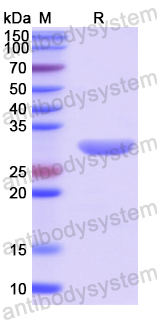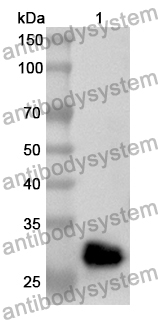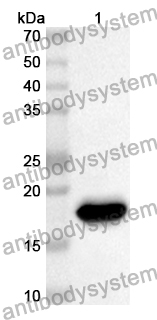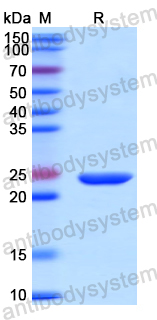Catalog No.
YHJ97401
Expression system
E. coli
Species
Homo sapiens (Human)
Protein length
Arg432-Asp683
Predicted molecular weight
30.39 kDa
Nature
Recombinant
Endotoxin level
Please contact with the lab for this information.
Purity
>90% as determined by SDS-PAGE.
Accession
Q9ULC5
Applications
ELISA, Immunogen, SDS-PAGE, WB, Bioactivity testing in progress
Form
Lyophilized
Storage buffer
Lyophilized from a solution in PBS pH 7.4, 0.02% NLS, 1mM EDTA, 4% Trehalose, 1% Mannitol.
Reconstitution
Reconstitute in sterile water for a stock solution. A copy of datasheet will be provided with the products, please refer to it for details.
Shipping
In general, proteins are provided as lyophilized powder/frozen liquid. They are shipped out with dry ice/blue ice unless customers require otherwise.
Stability and Storage
Use a manual defrost freezer and avoid repeated freeze thaw cycles. Store at 2 to 8°C for frequent use. Store at -20 to -80°C for twelve months from the date of receipt.
Alternative Names
Long-chain acyl-CoA synthetase 5, Long-chain-fatty-acid--CoA ligase 5, ACSL5, FACL5, LACS 5, Arachidonate--CoA ligase, ACS5
Deciphering mitochondrial dysfunction in keratoconus: Insights into ACSL4 from machine learning-based bulk and single-cell transcriptome analyses and experimental validation., PMID:40496889
PINLYP-mediated phospholipid metabolism reprogramming contributes to chronic herpesvirus infection., PMID:40373067
Homocapsaicin II induce ferroptosis in colorectal cancer cells via cholesterol-centrosome amplification-multipolarity axis., PMID:40319933
OTUB1 enhances fatty acid oxidation in APAP-induced liver injury by mediating ACSL5 deubiquitination., PMID:40280245
Scutellariae Radix and Coptidis Rhizoma improve NAFLD via regulation of SIRT6/ACSL5 pathway and SCD1., PMID:40254111
Proteomics Reveals the Role of PLIN2 in Regulating the Secondary Hair Follicle Cycle in Cashmere Goats., PMID:40141352
Transcriptomic profiling identifies ferroptosis and NF-κB signaling involved in α-dimorphecolic acid regulation of microglial inflammation., PMID:40038710
ELF5 gene promotes milk lipid synthesis in goat mammary epithelial cells by transcriptomic analysis., PMID:40015575
Inhibition of Bif-1 confers cardio-protection in myocardial infarction., PMID:39982446
AURKB inhibition induces rhabdomyosarcoma apoptosis and ferroptosis through NPM1/SP1/ACSL5 axis., PMID:39927464
Bioinformatics insights into ACSL1 and ACSL5: prognostic and immune roles in low-grade glioma., PMID:39924494
Metabolism-related proteins as biomarkers for predicting prognosis in polycystic ovary syndrome., PMID:39702179
A Novel Peroxisome-Related Gene Signature Predicts Breast Cancer Prognosis and Correlates with T Cell Suppression., PMID:39678026
ACSL5 promotes lipid deposition and lipoapoptosis in proximal tubular epithelial cells of diabetic kidney disease., PMID:39557186
USP29 alleviates the progression of MASLD by stabilizing ACSL5 through K48 deubiquitination., PMID:39355870
Acyl-CoA Synthetase Long-Chain Isoenzymes in Kidney Diseases: Mechanistic Insights and Therapeutic Implications., PMID:39210707
Decidualized Endometrial Stromal Cells Promote Mitochondrial Beta-Oxidation to Produce the Octanoic Acid Required for Implantation., PMID:39199401
Empagliflozin improves aortic injury in obese mice by regulating fatty acid metabolism., PMID:39176252
Transcriptome Analysis Reveals the Potential Key Genes in Nutritional Deposition in the Common Carp (Cyprinus carpio)., PMID:38998051
Obesity enhances the response to neoadjuvant anti-PD1 therapy in oral tongue squamous cell carcinoma., PMID:38923758
The mechanism of Traditional Mongolian medicine Daruqi particles on inflammation., PMID:38703870
Bioinformatics and system biology approaches to determine the connection of SARS-CoV-2 infection and intrahepatic cholangiocarcinoma., PMID:38648205
Voluntary Wheel Running Reduces Cardiometabolic Risks in Female Offspring Exposed to Lifelong High-Fat, High-Sucrose Diet., PMID:38595204
Intestinal Acyl-CoA synthetase 5 (ACSL5) deficiency potentiates postprandial GLP-1 & PYY secretion, reduces food intake, and protects against diet-induced obesity., PMID:38499083
Dietary elaidic acid boosts tumoral antigen presentation and cancer immunity via ACSL5., PMID:38350448
Transcriptomic analysis identifies diagnostic genes in polycystic ovary syndrome and periodontitis., PMID:38167332
Regulatory roles of ACSL5 in the anti-tumor function of palmitic acid (C16:0) <em>via</em> the ERK signaling pathway., PMID:37946526
Integrative proteome and metabolome analyses reveal molecular basis underlying growth and nutrient composition in the Pacific oyster, Crassostrea gigas., PMID:37838097
MOBILE pipeline enables identification of context-specific networks and regulatory mechanisms., PMID:37414767
ACSL5, a prognostic factor in acute myeloid leukemia, modulates the activity of Wnt/β-catenin signaling by palmitoylation modification., PMID:37131085
Hypoxia-responsive PPARGC1A/BAMBI/ACSL5 axis promotes progression and resistance to lenvatinib in hepatocellular carcinoma., PMID:36932115
More than just a histone deacetylase: cytoplasmic SIRT6 facilitates fatty acid oxidation through ACSL5 deacetylation., PMID:36880305
Sirtuin 6-A Key Regulator of Hepatic Lipid Metabolism and Liver Health., PMID:36831330
The Effects of Graded Levels of Calorie Restriction: XIX. Impact of Graded Calorie Restriction on Protein Expression in the Liver., PMID:36757838
Effects of metformin on clinical, hormonal and relevant gene expression parameters in patients with acne: an observational study., PMID:36656771
iTRAQ-based Proteomic Analysis Unveils ACSL4 as a Novel Potential Regulator of Human Endometrial Receptivity., PMID:36652382
Lysophosphatidylcholine inhibits lung cancer cell proliferation by regulating fatty acid metabolism enzyme long-chain acyl-coenzyme A synthase 5., PMID:36639836
Prognostic Role of Long-Chain Acyl-Coenzyme A Synthetase Family Genes in Patients with Clear Cell Renal Cell Carcinoma: A Comprehensive Bioinformatics Analysis Confirmed with External Validation Cohorts., PMID:36529627
Identification of fatty acid metabolism-related molecular subtype biomarkers and their correlation with immune checkpoints in cutaneous melanoma., PMID:36466837
SIRT6: therapeutic target for nonalcoholic fatty liver disease., PMID:36328906
Cytoplasmic SIRT6-mediated ACSL5 deacetylation impedes nonalcoholic fatty liver disease by facilitating hepatic fatty acid oxidation., PMID:36208627
Physicochemical, Nutritional Properties and Metabolomics Analysis Fat Deposition Mechanism of Chahua Chicken No. 2 and Yao Chicken., PMID:36011269
Impaired fatty acid metabolism perpetuates lipotoxicity along the transition to chronic kidney injury., PMID:35998043
Transcriptome Comparison Reveals the Difference in Liver Fat Metabolism between Different Sheep Breeds., PMID:35804549
Heat stress modulates the disruptive effects of Eimeria maxima infection on the ileum nutrient digestibility, molecular transporters, and tissue morphology in meat-type chickens., PMID:35657942
Explaining Unsaturated Fatty Acids (UFAs), Especially Polyunsaturated Fatty Acid (PUFA) Content in Subcutaneous Fat of Yaks of Different Sex by Differential Proteome Analysis., PMID:35627174
Transcriptome analysis of CRISPR/Cas9-mediated GPAM-/- in bovine mammary epithelial cell-line unravelled the effects of GPAM gene on lipid metabolism., PMID:35618221
The effect of black seed (Nigella sativa) extract on lipid metabolism in HepG2 cells., PMID:35483558
Gene Expression Profiles of Multiple Synchronous Lesions in Lung Adenocarcinoma., PMID:34943992
Mining massive genomic data of two Swiss Braunvieh cattle populations reveals six novel candidate variants that impair reproductive success., PMID:34915862




